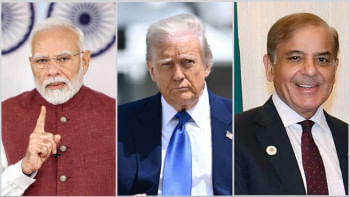The Norad response came late

Photo: Shafiq Islam/ DrikNews
YIPPIE! Norad has spoken at last. Last Wednesday, late in the afternoon Bangladesh time, it released a statement that should clear the smog of doubts hanging over Grameen Bank and Muhammad Yunus. The Norwegian aid agency has confirmed that there was no embezzlement done by the poor man's banker and his bank, although Grameen Bank did transfer Norwegian fund to Grameen Kallyan, "breaching agreement."
The question is why did Norad take so long? Why did it wait until the news spread like a forest fire and speculations ran amok whether some kind of misappropriation could have indeed happened? And the same Norwegian minister, Erik Solheim, who is quoted in the clarification statement, told BBC few days earlier that it was "totally unacceptable that aid is used for other purposes than intended."
It is still difficult to understand what was the purpose of the investigative TV documentary Fanget I Mikrogjeld (caught in micro debt) to mention an irregularity that was already regularised after a baby born at the time of occurrence grew up to be twelve. The Norad statement claims that the report raised the question of where the Norwegian aid money had gone. In a higher democracy like Norway, people and press have the right to hold their government accountable for every single krone spent.
The television documentary was clear on what it meant. It talked about how Grameen Bank borrowers were sinking deeper in debt and in the same breath also mentioned the "unauthorized" transfer of Norad money to a sister concern as a statement of fact.
But what the documentary did with that inference is ludicrous by all accounts. It could have been more explicit in its presentation. It could have stated in clear terms that there was no embezzlement or even avoided the mention of an irrelevant piece of information unless the intention was to create hype. By the time Norad opened its mouth, the scandal had grown arms and legs.
For many of us it came as a shock. Not that we believed everything that was said, but the doubt had definitely raised its ugly head in our minds. For a while, it convinced us that after 170 years Honore de Balzac could be right once again, that behind every fortune there could be a crime. It was more shocking to see how quickly everything looked yellow to jaundiced eyes. Faster than light, the presumptuous scandal smudged our impression of a man like the ominous scratch on a brand new car.
For that the blame definitely goes to the Norwegians. They obfuscated the world and then took their time before coming forward with a clarification. By then our own government, forget rest of the world, was convinced that there was fat in the fire. The prime minister hurled innuendos at the Grameen Bank founder and vowed to hold an investigation over the allegation against him. Earlier, the general secretary of her party had said Bangladesh Bank was going to conduct an investigation.
Another senior leader of the party went one notch up. He indicted Muhammad Yunus as the "most corrupt" man, supposedly in the country (?). The secretary of the ruling party's student arm was even more ludicrous. He fancied that the Nobel Laureate should be stripped of his title. Hobbling for a middle ground, the finance minister managed to say nothing was wrong with the fund transfer since it was already resolved between two sides.
In hindsight, it looks like one of the sides, the Norwegians, had accepted that resolution with a grudge. Because, neither the Norwegian government nor its embassy in Bangladesh nor Norad stepped up to the plate to defuse the crisis until two days ago. The Norwegian response should have come sooner, preferably when the documentary was being made.
Meanwhile, our government has led itself into an offside trap. Its jejune response to the allegation showed the reflex of a restless ambush as if it was waiting for an opportune moment to strike back. In so much as the government was free to hold an inquiry, it made the whole thing sound like an inquest.
The Norwegian response does not appear to be enough. Its matter-of-fact clarification came late in the day and doesn't explain why it couldn't promptly come up with an answer already given twelve years ago. Its minister could check on records facts and tell facts to BBC instead of speaking from the high moral ground.

 For all latest news, follow The Daily Star's Google News channel.
For all latest news, follow The Daily Star's Google News channel. 



Comments